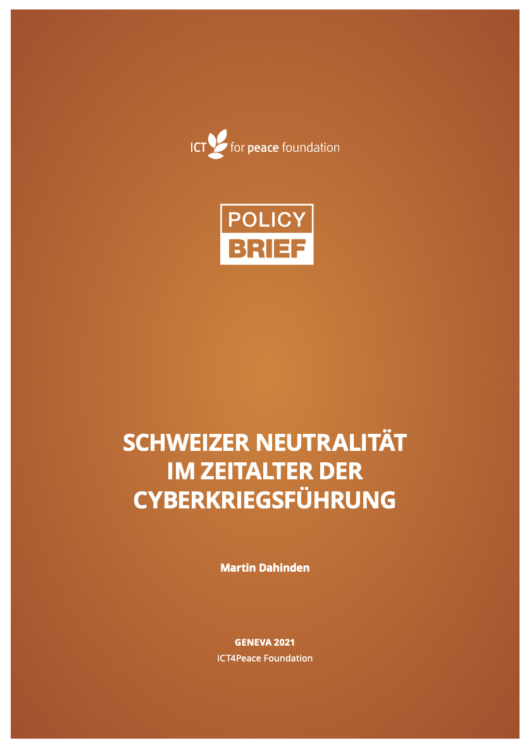ICT4Peace is proud to publish a first of its kind discussion paper by Martin Dahinden on Swiss neutrality in the age of cyber warfare.
The original text in German can be found here, the French translation here and the English translation here.
After publishing an article in Neue Zürcher Zeitung (NZZ) on the same topic together with Sara Pangrazzi, Martin Dahinden, former Swiss Ambassador to the United States and member of the Foundation Board of ICT4Peace, kindly agreed to write this discussion paper. In addition the article published in the NZZ was translated into French and published in the Revue de l’Armee Suisse: “Neutralité dans le Cyberspace: Un défi pour la Suisse”.
See also article by Martin Dahinden in infosuisse.ch entitled “Neutralität im Cyberspace: Neue Herausforderungen für die Schweiz”.
Cyber warfare is a new and significant challenge for Swiss neutrality. Based on the law of neutrality and Swiss neutrality policy, this discussion paper outlines important legal, political and conceptual issues. First and foremost, it is a contribution to an emerging debate, but it points also to opportunities that arise for Switzerland in the changing environment.
Martin Dahinden in the introduction writes: The questions about the rights and obligations of neutral states in cyberspace are complex and can by no means be answered with simple deductions from neutrality law and conventional neutrality policy.
Today, there is a broad international consensus that international law is also applicable to cyberspace. However, legal opinions and political attitudes differ widely as to what this means in concrete terms for the individual norms of international law. This conclusion must be drawn in particular from the deliberations that have taken place over the past few years within the framework of the UN. The understanding of the problem has been deepened; in part, common views have been formulated. However, a real breakthrough in the critical questions and binding norms has not yet been achieved, because political differences cannot be solved by formulating legal opinions.
The law of neutrality has been an issue, directly or indirectly, in the international forums dealing with cyber issues. It is obvious that in the age of cyber warfare there will be conflicts and third states that do not participate in them as well. For these third states, the rights and obligations of a neutral state apply. It is therefore not surprising that the Tallinn Manual4 contains a special chapter on neutrality.
However, Switzerland’s permanent neutrality goes far beyond the core of neutrality law. Even in times of peace, Switzerland follows a policy that makes credible that the country will remain neutral in future international armed conflicts.
Cyber space is new domain with many special features. For this reason, Switzerland’s neutrality policy for the age of cyber warfare cannot simply be derived from existing doctrines on neutrality policy but requires above all fresh security policy thinking.5
Permanent neutrality is the basis for Switzerland’s special role in the community of states. Because advantages arise from permanent neutrality, Switzerland has always understood its neutrality status as a duty to make a special contribution to peace and security in the world. This includes, among other things, humanitarian engagement, the willingness to render good offices, efforts to strengthen international law, commitment to confidence-building measures, conflict prevention and conflict management. How can and should this role be fulfilled in the age of cyber warfare?
